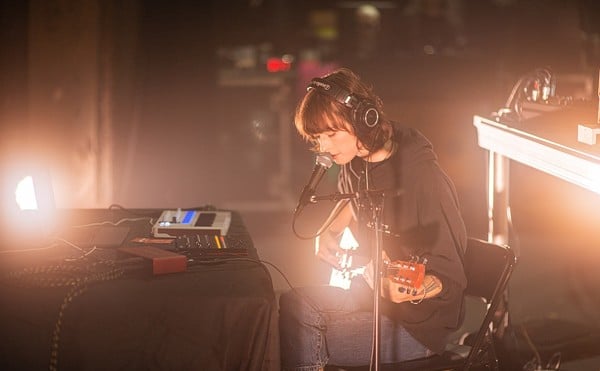|
Picture being at a late-night house joint where the hostess never runs out of good 45s. That's something like listening to Sharon Jones and the Dap-Kings, whose unadulterated Rhythm & Blues sounds light years more bona fide and warm than most retro-Soul recordings ever muster.
"That's because we use analog," says Jones, 51, from her Brooklyn home. "We don't have anything digital in our studio. We go and record ourselves like they did back in the day, live."
Neal Sugarman and Gabriel "Bosco Mann" Roth founded the self-built Daptones Studios, a brownstone in Brooklyn. Modeled after all-in-one Soul studios like Stax, it s where the Dap-Kings replicate the '60s sound by using an Ampex 8-track recorder to capture a full frequency of everything, even the soft nuances of flutes and violins. Torn up tires and old clothes pad the sound booth and sessions are edited the old-fashioned way, using razor blades to cut and splice reel-to-reel tape.
But the studio is only one compartment of the Dap-Kings' wall of sound. Onstage, the feet and the toes of it come from Jones as she channels James Brown's frenzied shouts and the bold Soul-Sister attitude of Tina Turner's later recordings with Ike.
"Those guys are amazed that I can get up there and sing and I can have energy that those guys don't have," she says. "I'm on the stage and they'll be like blowin' back there. When I'm finished with them, some of them have to end up throwin' away their clothes. After wearing their suits a few times, they get so sweat-soaked the salt builds up in them and they have to end up throwing things away."
Her tireless performances now earn her press nicknames like "The Female James Brown" and "Queen of Funk." Once branded "too black," "too fat" and "too old" by '80s music industry standards, those indictments have rolled off her back like trickles of sweat now that Jones gets to play with renowned artists like Lou Reed, Rufus Wainwright and David Byrne.
"I guess it took the Dap-Kings to play behind Amy Winehouse and Mark Ronson," she says, referring to the mainstream buzz garnered from Winehouse's Back to Black CD, which featured the Kings prominently.
Long before that, they'd already made believers out of deep Soul fans. Some of them even wrote to find out if their horn-driven version of Janet Jackson's "What Have You Done for Me Lately" was the original. Subsequently their albums (Dap Dippin', Naturally and 2007's 100 Days, 100 Nights) contributed to making the name Sharon Jones and the Dap-Kings synonymous with "sold out, standing room-only shows."
But performances at a Bluegrass festival and South By Southwest brought Jones to Denzel Washington's attention when he was looking to fill the role of juke-joint singer Lila in The Great Debaters, beating Mary J. Blige and Blues singer Shemekia Copeland for the part.
"Denzel got me because someone said, 'She's not well known, but she's been out here and we think she can play the part," Jones says of her Bessie Smith-based role.
Jones also sings seven songs on The Great Debaters soundtrack. Not bad for a lady who had to wait until Soul music became referred to as "throwback" and "old school" before she could be seen as a singer.
In the '70s, Jones sang on Disco, Gospel and R&B records but her name wasn't credited. By 25, record executives already considered her and her Gospel-inflected sound "old." Eventually she stopped working as a singer and became a Rikers Island prison corrections officer.
Thirteen years ago the Dap-Kings were recording as The Soul Providers, a house band for Roth's diminutive (and now defunct) label, Desco Records. Their style was based on James Brown's backing band, The JB's. While working with '60s Deep Soul artist Lee Fields, they wanted three female background singers.
"My ex was playing with the musicians and he said, 'Well, my lady can sing,' so I went in and started recording," Jones remembers.
At the time, it wasn't a crowning moment for her as a singer, because when she and The Soul Providers cut their first 45 together she was almost 40 and they were still teenagers.
"The first recording I did with them 13 years ago, I thought it was a joke," she says. "My first thought was, 'What do these little white boys know about Funk and Soul?' They showed me what they knew. I mean, the drummer (Homer Steinweiss) at the time was 16. And most of those lyrics on the first two albums was written by 'Bosco Mann' (Roth's alias), a young Jewish boy playing the bass."
Jones says the Dap-Kings learned from her that Soul was something that "either you have or you don't."
"To be a singer," she says, "maybe people can learn vocally how to hold a note, but it's gotta be in you to sing it. That's when it comes out to me, I consider that the soul, 'cause Soul comes from the heart. What comes from the heart, reaches the heart."
SHARON JONES AND THE DAP-KINGS perform Thursday at Bogart's. Buy tickets and find nearby bars and restaurants here.





